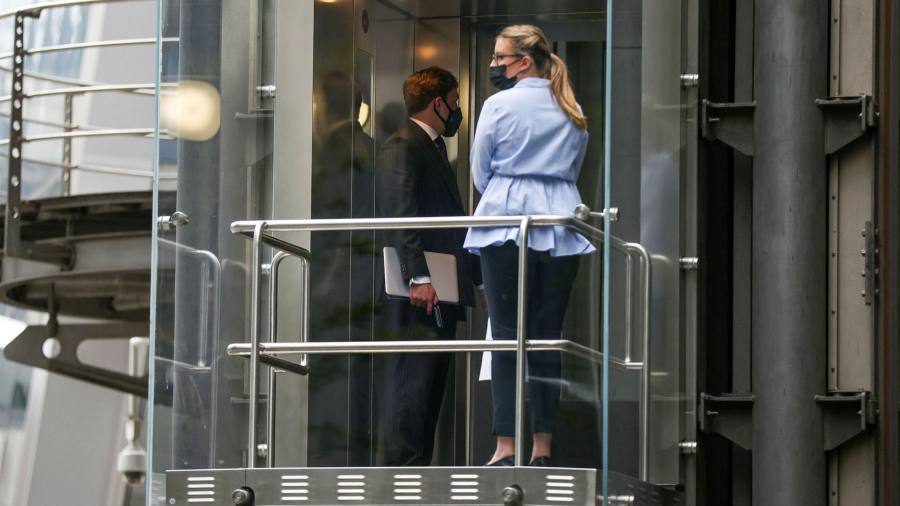Employers face ‘legal vacuum’ when all Covid restrictions lift in England

Employers have warned they will be flying blind from Thursday when all Covid-19 restrictions in England end as the UK government has failed to issue guidance on how to ensure workplace safety.
The concerns of business stem from the refusal by ministers to fund free workplace testing or to keep refunding small businesses for the costs of statutory sick pay beyond April 1. Both were core demands from lobby groups and unions ahead of the announcement of the “Living with Covid ”strategy by prime minister Boris Johnson at the start of the week.
The generosity of statutory sick pay will be scaled back even sooner. From Thursday, workers will only be able to claim from the fourth day of contracting Covid rather than from day one at present.
The message from business secretary Kwasi Kwarteng to business leaders in a meeting on Monday was that life should go back to normal, said people familiar with the conversation, while small business minister Paul Scully talked about the importance of returning staff to the office.
The UK sal decision to end the requirement to self-isolate after a positive Covid-19 test in England contrasts with the approach in Scotland, where first minister Nicola Sturgeon said on Tuesday that testing would remain free, with those testing positive still required to self -isolate.
Matthew Fell, chief policy director at the CBI business organization, said Johnson’s approach in England risked leaving companies in a “legal vacuum”, with no guidance in place on the extent of employers’ liability if staff came to the workplace while sick and infected others. .
Officials have told business groups the current guidance on working safely during Covid would be revised and folded into standard health and safety guidance, but that this will not happen until April.
Craig Beaumont, chief of external affairs at the Federation of Small Businesses, said this left employers facing a five week “free for all”, in which they would not know whether to insist that staff stayed home while ill, or what to do if an employee showed symptoms but had not taken a test.
The British Chambers of Commerce also said employers would need “very clear” guidance on their liability in keeping staff and customers safe if they were to return to operating at full capacity.
The main concern of small businesses was to have clear discretion to set and enforce their own policies, Beaumont said, because many would still want to take precautions to protect vulnerable staff and customers.
But he added that many of the FSB’s members were deeply worried about the cost of testing and sick pay for staff who fell ill: “Most employers will have a good conversation and will fund sick pay – the problem will happen if businesses can’t afford it or if an employee insists on coming in. ”
Unions have warned that some 8mn workers will be affected by the decision to end day one eligibility for statutory sick pay, with the TUC calling it a “retrograde step” that was “wrong on every level”.
Sadiq Khan, the Labor mayor of London, warned scrapping free testing could make the goal of “living with Covid” a “privilege of the well-off”.
Ann Francke, head of the Chartered Management Institute, said the gener approach left too much to individuals’ discretion, arguing that ending free testing and sickness payments was “counterproductive to encouraging individuals and employers to behave responsibly.”
Big white collar employers told the FT they were still working through what the relaxation would mean for their companies, given the need to balance the safety and confidence of their staff with the lack of any official guidance.
KPMG said it was still advising staff to wear masks in lifts and washrooms, and was stressing the importance of not coming into the office with any Covid or cold-like symptoms. Client-facing workers have been asked to return to offices or client sites for a minimum of two days a week.
Kevin Ellis, chair and senior partner at PwC, said the ending of restrictions would send a “strong signal” to return to offices, without brushing aside. . . a better balance between work and home ”. The firm will advise people to use personal judgment – for example, working from home if they have symptoms of Covid.
Alistair Elliott, senior partner of property agents Knight Frank, said the overall message was now “back to normal”, although the company would continue with some measures such as booking desks. “We are asking people to be sensible. If you feel poorly then stay at home. But it’s time for our towns and city centers to get back to normal. ”
But other bosses said relying on personal judgment posed a problem, given the need for clear internal guidelines about staff behavior.
The CBI’s Fell said that while most companies would take a “common sense” approach, it would be much easier for employees who were able to work from home than for those who had to staff a production line or shop floor.
“It relies on employers and individuals doing the right thing and working it out – guidance on how that works for sick pay and employers’ liability would be really helpful,” he said.
The government declined to comment beyond pointing out that it was still funding testing for symptomatic social care staff and was working with retailers to ensure that everyone who wanted to buy a test could get one.
Additional reporting by Mure Dickie
Source link



